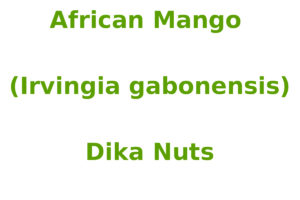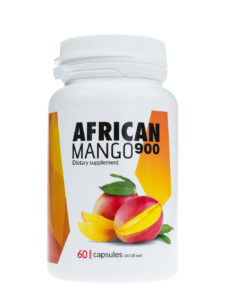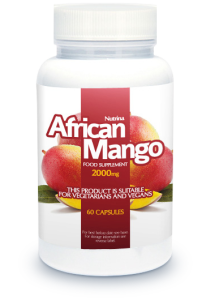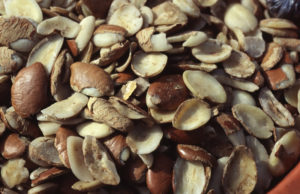 Irvingia gabonensis a species of African trees of Irvingia type called: wild mango (wild mango), African Mango, Mango or Dika nuts. Mango have edible fruit and seeds (valued especially for fat and protein). The fat extruded from the seeds of Irvingia gabonensis (the so-called. “Butter cay-cay”) is used, among others, for producing chocolate. In West Africa crushed seeds of this species are eaten on the side of fish dishes.
Irvingia gabonensis a species of African trees of Irvingia type called: wild mango (wild mango), African Mango, Mango or Dika nuts. Mango have edible fruit and seeds (valued especially for fat and protein). The fat extruded from the seeds of Irvingia gabonensis (the so-called. “Butter cay-cay”) is used, among others, for producing chocolate. In West Africa crushed seeds of this species are eaten on the side of fish dishes.
Coats seed should be crushed to get to the endosperm. The seeds, also called Dika nuts are eaten both raw and roasted. From the fat extruded from seeds the edible oil (a solid at room temperature) and margarine are produced. This is an excellent base for the production of butter and chocolate. The oil is further processed into soaps or cosmetics. The residue after squeezing oil (press cake) is used to feed cattle and as a thickener in soups.
The very african mango seeds are ground or crushed and later used as a thickener or as an added flavor of soups and stews. A popular use of Irvingia gabonensis seed is for baking a cake called “Dika bread”.
African mango and slimming
According to scientific research, published in the British Biotechnology Journal, an extract from the seeds of African mango is a great fat burner. Dietary supplements based on African mango help to lose weight[4], even in case of people who do not combine a slimming diet with physical activity. Currently, the extract from African mango seeds is available in a form of a tablet – a dietary supplement for weight loss. Summary of the best medications of this type, see: Ranking of slimming tablets containing African mango . Ranking contains only high-quality capsules, whose effectiveness and quality have been confirmed by scientific research and customer feedback. The quality of seed extract, their processing and storage are essentially significant and the products of dubious quality and origin were deliberately omitted . Losing weight is a very important process and should therefore be supported by supplementation of the highest quality. Health and safety are of a paramount importance.
Side effects
The most common side effects while taking preparations from the seeds of African mango is a headache, bloating, and sleep disorders.
Nutrients Seed African Mango
African mango seeds (Irvingia gabonensis) contain 697 calories per 100g. The precious fatty acids include:
| Acid | % |
|---|---|
| myristic acid – C14H28O2 | 33-70% |
| lauric acid – C12H24O2 | 20-59% |
| oleic acid – C18H34O2 | 1-11% |
| palmitic acid – C16H32O2 | 2% |
| stearic acid – C18H36O2 | 1% |
Mineral composition (mg/100g) of raw and defatted African mango (Irvingia gabonensis) seeds
| Minerals | Raw sample | Defatted sample | |
|---|---|---|---|
| Sodium | Na | 30.1 | 36.7 |
| Potassium | K | 43.1 | 51.7 |
| Calcium | Ca | 14.4 | 22.6 |
| Magnesium | Mg | 48.3 | 54.5 |
| Zinc | Zn | 4.30 | 6.73 |
| Iron | Fe | 0.25 | 5.15 |
| Manganese | Mn | 0.33 | 1.21 |
| Copper | Cu | 0.42 | 1.35 |
| Lead | Pb | 0.03 | 0.12 |
| Phosphorus | P | 24.3 | 24.9 |
Dietary supplements for weight lost with African Mango
We present 3 products (Dietary supplements for weight loss with african mango), which are absolutely the best in their category.
| African Mango 900 ™ |
|---|
 |
| |||||||
| ||||||||
               This product is available worldwide | ||||||||
| African Mango ™ |
|---|
 |
| |||||||
| ||||||||
                     This product is available worldwide | ||||||||
References & External links
- Chemical composition and functional properties of raw, heat-treated and partially proteolysed wild mango (Irvingia gabonensis) seed flour, Sunday Y. Giami, Vitalis I. Okonkwo, Monday O. Akusu, Food Chemistry, Volume 49, Issue 3, 1994, Pages 237-243.
- Polyphenolic compounds and antioxidant properties in mango fruits, Xiaowei Ma, Hongxia Wu, Liqin Liu, Quansheng Yao, Songbiao Wang, Rulin Zhan, Shanshan Xing, Yigang Zhou, Scientia Horticulturae, Volume 129, Issue 1, 25 May 2011, Pages 102–107.
- African Mango Glycosidically Bound Volatile Compounds, M. Sakho, D. Chassagne, J. Crouzet, J. Agric. Food Chem., 1997, 45 (3), pp 883–888.
- Chemical and Amino Acid Composition of Raw and Defatted African Mango (Irvingia gabonensis) Kernel, Ogungbenle Henry Niyi, British Biotechnology Journal, ISSN: 2231-2927,Vol.: 4, Issue.: 3 (March).
- IGOB131, a novel seed extract of the West African plant Irvingia gabonensis, significantly reduces body weight and improves metabolic parameters in overweight humans in a randomized double-blind placebo controlled investigation, Ngondi JL, Etoundi BC, Nyangono CB, Mbofung CM, Oben JE, Lipids Health Dis. 2009 Mar 2;8:7.
- The effect of Irvingia gabonensis seeds on body weight and blood lipids of obese subjects in Cameroon, Judith L Ngondi, Julius E Oben, Samuel R Minka, Lipids Health Dis. 2005, 4.
- The use of a Cissus quadrangularis / Irvingia gabonensis combination in the management of weight loss: a double-blind placebo-controlled study, Julius E Oben, Judith L Ngondi, Claudia N Momo, Gabriel A Agbor, Caroline S Makamto Sobgui, Lipids Health Dis. 2008;31.
- Mango seed uses: thermal behaviour of mango seed almond fat and its mixtures with cocoa butter, J.A. Solı́s-Fuentesa, M.C. Durán-de-Bazúab, Bioresource Technology, Volume 92, Issue 1, March 2004, Pages 71–78.
- Physico-chemical changes in African mango (Irvingia gabonensis) during normal storage ripening, Johnson O. Aina, Food Chemistry, Volume 36, Issue 3, 1990, Pages 205-212.
- Studies on the effects of microbial fermentation on bush mango (Irvingia gabonensis) seed cotyledons, Ekundayo F. O., Oladipupo O. A., Ekundayo E. A., African Journal of Microbiology Research 7, no. 34 (2013): 4363-4367.
- Volatile Components of African Mango, M. SAKHO, J. CROUZET, S. SECK, Journal of Food Science Volume 50, Issue 2, pages 548–550, March 1985.
- Physico-chemical attributes of wild mango (Irvingia gabonensis) seeds, J.K. Joseph, Bioresource Technology, Volume 53, Issue 2, 1995, Pages 179-181.
- Inhibition of Irvingia gabonensis seed extract (OB131) on adipogenesis as mediated via down regulation of the PPARgamma and Leptin genes and up-regulation of the adiponectin gene, Julius E Oben, Judith L Ngondi, Kenneth Blum, Lipids in Health and Disease20087:44, DOI: 10.1186/1476-511X-7-44.
- Cameroonian medicinal plants: a bioactivity versus ethnobotanical survey and chemotaxonomic classification, Fidele Ntie-Kang, Lydia Likowo Lifongo, Luc Meva’a Mbaze, Nnange Ekwelle, Luc C Owono Owono, Eugene Megnassan, Philip N Judson, Wolfgang Sippl, Simon M N Efange, BMC Complementary and Alternative Medicine. The official journal of the International Society for Complementary Medicine Research (ISCMR)201313:147, DOI: 10.1186/1472-6882-13-147
- Antimicrobial activity of the methanolic extract, fractions and compounds from the stem bark of Irvingia gabonensis (Ixonanthaceae), Victor Kuetea, Ghislain Fotso Wabo, Bathélémy Ngameni, Armelle Tsafack Mbaveng, Robert Metuno, François-Xavier Etoa, Bonaventure Tchaleu Ngadjui, Véronique Penlap Beng, J.J. Marion Meyer, Namrita Lall, Journal of Ethnopharmacology, Volume 114, Issue 1, 8 October 2007, Pages 54–60
- Analgesic effect of Irvingia gabonensis stem bark extract, Chinedu O. Okolo, Patricia B. Johnson, Ezzel M. Abdurahman, Ibrahim Abdu-Aguye, Isa M. Hussaini, Journal of Ethnopharmacology, Volume 45, Issue 2, February 1995, Pages 125-129.
- Uses, management and economic potential of Irvingia gabonensis in the humid lowlands of Cameroon, Elias T Ayuk, , Bahiru Duguma, Steve Franzel, Joseph Kengue, Matthias Mollet, Theophile Tiki-Manga, Pauline Zenkeng, Forest Ecology and Management, Volume 113, Issue 1, 4 January 1999, Pages 1–9.
- Vegetative propagation of Irvingia gabonensis, a West African fruit tree, P.N. Shiembo, A.C. Newton, R.R.B. Leakey, Forest Ecology and Management, Volume 87, Issues 1–3, 31 October 1996, Pages 185-192.
- EGRAS, Amy M., et al. An evidence-based review of fat modifying supplemental weight loss products. Journal of obesity, 2010, 2011.
- “Irvingia gabonensis“. Ecocrop. Food and Agriculture Organization. 1993–2007.
- Irvingia gabonensis (Aubry-Lecomte ex O’Rorke) Baill, Z. Tchoundjeu World Agroforestry Centre (ICRAF), African Humid Tropics Region, P.O. Box 2067 or 16317, Yaoundé, Cameroon, A.R. Atangana Forest Biology Research Centre, Pavillon Marchand, Université Laval, Sainte-Foy, Québec G1K 7P4, Canada, Plant Resources of Tropical Africa (PROTA)
- An Evidence-Based Review of Fat Modifying Supplemental Weight Loss Products, Amy M. Egras, William R. Hamilton, Thomas L. Lenz, Michael S. Monaghan, Journal of Obesity.
- Irvingia gabonensis (Wikipedia) – https://en.wikipedia.org/wiki/Irvingia_gabonensis
- Myristic acid, also called tetradecanoic acid, is a common saturated fatty acid with the molecular formula CH3(CH2)12COOH. A myristate is a salt or ester of myristic acid. Myristic acid is named after the nutmeg Myristica fragrans. PubChem Public Chemical Database: Tetradecanoic acid.
- Lauric acid or systematically, dodecanoic acid, is a saturated fatty acid with a 12-carbon atom chain, thus falling into the medium chain fatty acids, is a white, powdery solid with a faint odor of baby oil or soap. The salts and esters of lauric acid are known as laurates. PubChem Public Chemical Database: lauric acid.
- Oleic acid is a fatty acid that occurs naturally in various animal and vegetable fats and oils. It is an odorless, colorless oil, although commercial samples may be yellowish. PubChem Public Chemical Database: oleic acid .
- Palmitic acid, or hexadecanoic acid in IUPAC nomenclature, is the most common saturated fatty acid found in animals, plants and microorganisms. Its chemical formula is CH3(CH2)14COOH. As its name indicates, it is a major component of the oil from the fruit of oil palms (palm oil). PubChem Public Chemical Database: palmitic acid.
- Stearic acid is a saturated fatty acid with an 18-carbon chain and has the IUPAC name octadecanoic acid. It is a waxy solid and its chemical formula is C17H35COOH. Its name comes from the Greek word στέαρ “stéar”, which means tallow. PubChem Public Chemical Database: stearic acid.
Translations
| The article "African Mango (Irvingia gabonensis)" in other languages | |
|---|---|
| African Mango (Irvingia gabonensis) po Polsku. African Mango (Irvingia gabonensis) |  |
| Afrikanische Mango (Irvingia gabonensis) Deutsch. Afrikanische Mango (Irvingia gabonensis) |  |
| Mango Africano (Irvingia gabonensis) Español Mango Africano (Irvingia gabonensis) |  |






